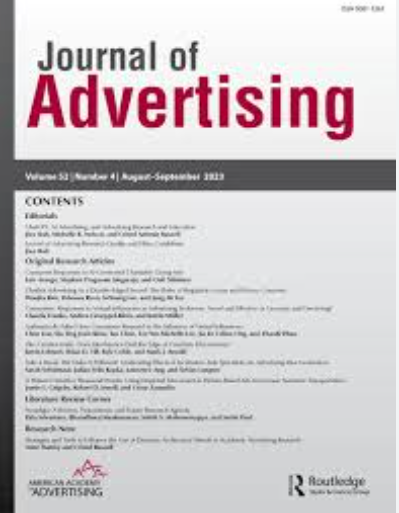The Future of Dataveillance in Advertising Theory and Practice
IF 7
2区 管理学
Q1 BUSINESS
引用次数: 5
Abstract
Abstract Technological developments have changed the advertising landscape by extending the possibilities to collect, process, and share consumer data to optimize advertising. These developments have made data collection and consequently dataveillance—the automated, continuous, and sometimes unspecific collection, storage, and processing of digital traces—central concepts for advertising scholarship and practice. Studying the impact of consumers’ perceptions of dataveillance is important as perceptions about data collection practices have been shown to diminish the effects of data-driven advertising. This article advances advertising theory by conceptualizing the impact of consumers’ perceptions of dataveillance in digital data-driven advertising and applying long-standing advertising research theories to this new phenomenon to provide an overarching framework for future research. The current work presents the dataveillance effects in advertising landscape (DEAL) framework, with specific research directions for future research. This framework has practical implications as it shows how false or accurate beliefs about dataveillance impact consumer responses to digital data-driven advertising. Advertisers may adapt to ensure that digital data-driven advertising does not result in backlash or raise ethical questions. Finally, the framework has implications for privacy regulations, as consumer understanding of data collection is a core issue in current regulatory approaches to dataveillance.广告理论与实践中数据监控的未来
技术的发展扩大了收集、处理和共享消费者数据以优化广告的可能性,从而改变了广告的格局。这些发展使得数据收集和数据监控——自动的、连续的、有时不具体的数字痕迹收集、存储和处理——成为广告学术和实践的核心概念。研究消费者对数据监控的看法的影响很重要,因为对数据收集做法的看法已被证明会减少数据驱动广告的影响。本文通过概念化消费者对数字数据驱动广告中数据监控的感知的影响,并将长期存在的广告研究理论应用于这一新现象,为未来的研究提供一个总体框架,从而推进广告理论。目前的工作提出了广告景观(DEAL)框架中的数据监控效应,并为未来的研究提供了具体的研究方向。该框架具有实际意义,因为它显示了关于数据监控的错误或准确信念如何影响消费者对数字数据驱动广告的反应。广告商可能会做出调整,以确保数字数据驱动的广告不会引起反弹或引发道德问题。最后,该框架对隐私法规有影响,因为消费者对数据收集的理解是当前数据监控监管方法中的核心问题。
本文章由计算机程序翻译,如有差异,请以英文原文为准。
求助全文
约1分钟内获得全文
求助全文
来源期刊

Journal of Advertising
Multiple-
CiteScore
11.20
自引率
10.50%
发文量
55
期刊介绍:
The Journal of Advertising is the premier journal devoted to the development of advertising theory and its relationship to practice. The major purpose of the Journal is to provide a public forum where ideas about advertising can be expressed. Research dealing with the economic, political, social, and environmental aspects of advertising, and methodological advances in advertising research represent some of the key foci of the Journal. Other topics of interest recently covered by the Journal include the assessment of advertising effectiveness, advertising ethics, and global issues surrounding advertising.
 求助内容:
求助内容: 应助结果提醒方式:
应助结果提醒方式:


